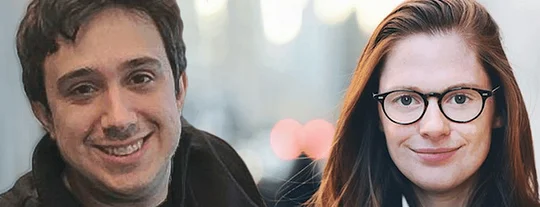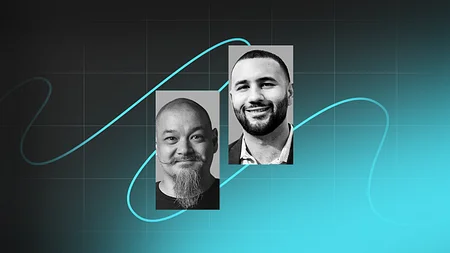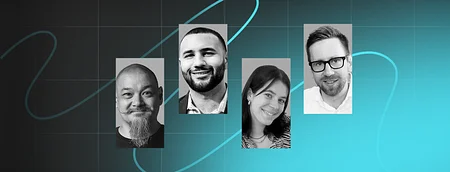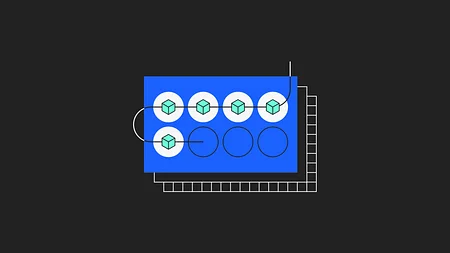Tezos co-founders Kathleen & Arthur Brietman, on Tezos and token sales
Simon interviewed the husband and wife team Arthur and Kathleen Brietman, the co-founders of Tezos, about their recent token sale for the very first episode of Blockchain Insider.
KB: We met in 2010, we started dating, and then we got married in 2013. I was still in college when we met, I graduated in 2012, and then I worked at a VC, and I helped some distressed portfolio companies try to turn around. I spent a bit of time at Bridgewater Associates, which is a large, macro hedge fund, and then I went into consulting. I worked at Accenture for some time, and then eventually, on blockchain technology, which led me to take a job at R3. Towards the middle of my tenure at R3, Tezos became really popular again, so I left R3 to take on operations at Tezos full time, in September of 2016.
AB: My background is in statistics and quantitative finance. I worked at Goldman Sachs and Morgan Stanley as a market maker, essentially writing algorithms to look at price signals, and trying to decide, what is the right price to buy or sell a stock or an option. I got interested in bitcoin fairly early on, before the network actually launched, back in 2008. I was fascinated by the idea, but the one thing that struck me was, bitcoin is the first digital ledger of its kind, but what matters is the entries in the ledger. The bitcoin algorithm doesn’t have to be perfect, we can make it better over time, as long as we preserve the ledger itself. That really resonated with me, because my worry at the time was, “Hey, this is fantastic, this is the beginning of something, but how is bitcoin going to stay current with all the technological innovation that’s sure to happen in this space?”
"Bitcoin is the first digital ledger of its kind, but what matters is the entries in the ledger. The bitcoin algorithm doesn’t have to be perfect [...] as long as we preserve the ledger itself."
And so, that answer stayed with me for a while, and I started being a little disappointed when I saw that there were really cool innovations like private transactions that Zcash has implemented, that didn’t seem to be of interest to bitcoin or smart contracts. Bitcoin didn’t seem to have a strong urge to adopt this new innovation, and in fact, I saw a sour grape tendency, where people were saying, “Hey, actually smart contracts are a bad idea,” or, “Actually, we don’t want private transactions because they have such and such feature.” So it got me thinking that even though bitcoin was an anti-political project in some sense, everything is meant to be ruled by one algorithm, it’s mathematical, there’s no subjectivity in it, I don’t think you can actually rule out the politics of a system. I think politics are like hurricanes. I don’t necessarily like them, but they exist.
The idea of Tezos is that it actually takes the political element into account. It says, “Look, we’re very early in this space, there’s going to be a lot of innovations.” It would be great to have a protocol that doesn’t change, but if we do that, we’re going to stagnate. We need a way to actually update our protocol, to stay current, but we don’t want to just have one person that says, “Okay, this is the new version of the protocol.” The idea is to have a formal governance model, to build in the blockchain, use the consensus-making ability of a blockchain to make consensus over how it should evolve. So, it puts the stakeholder of the blockchain in charge of deciding how they want the blockchain to run, what type of consensus algorithms they want to run, what type of tradeoff do they want between centralization and throughput? All these type of decisions can be put in the hands of the people who actually use the ledger.
"The idea is to have a formal governance model to build in the blockchain; use the consensus-making ability of a blockchain to make consensus over how it should evolve."
It’s a really delicate challenge that we’re now seeing in the bitcoin space, where they’re struggling to process transactions, they’re getting slower and slower. What insights did that lead you to, and what is Tezos, and how does that try and help address those?
AB: Most people were discussing bitcoin’s capability at the time in 2014, when the Tezos papers came around. Of course, people were already discussing bitcoin scalability, but they were discussing it purely as an engineering problem. It was not discussed as a governance crisis, the governance crisis came after. So, in that respect, I think that the paper foresaw the governance problems. And, you know, the thing is, from an engineering standpoint, there are solutions to the scalability problem with bitcoin, and in fact, bitcoin is considering two [solutions], it just can’t decide [which to use].
"People were already discussing bitcoin scalability, but they were discussing it purely as an engineering problem. It was not discussed as a governance crisis, the governance crisis came after."
One has more transactions on the blockchain, but can lead to more centralization, and decentralization is an important aspect of bitcoin, so that can be problematic. The other one has more option transaction, which doesn’t necessarily lead to more centralization, but it changes the nature of the transaction on bitcoin, and people just can’t agree on which one they want to go with, and it creates this huge political deadlock. There’s also other solutions, which are a little bit more out of left field. There’s something called Bitcoin-NG which has great scalability, doesn’t introduce more centralization, it’s a fantastic solution, and it’s barely being considered, because it’s just so different than bitcoin that I think that the idea of saying, “Hey, we’re going to have a radical change,” is just out of the agenda for anyone involved in bitcoin at this point, and that’s too bad. I think that it ought to be radical. There’s a tendency to treat it as already having arrived, bitcoin has made it, and all it needs to do now is survive, and not commit a single mistake.
It’s finished, so long as it survives, it’s done, but then you could say the same for Netscape. You could have probably said the same for Myspace. They worked, but were they ready for the big time? There’s something about network effects that people say a lot, where it’s because it’s the biggest, it will be around forever, but actually, being the biggest doesn’t guarantee you success.
Who is Tezos for, what does it mean to have this platform, and who should use it?
AB: In terms of its usage, it’s in the same category as bitcoin and Ethereum, and there’s been a tendency to say that bitcoin and Ethereum are complementary. People have been saying, “Oh, bitcoin is coal, Ethereum is gas.” I think that it might be the intention of the Ethereum developers to do that, but I think the overlap is much greater than people imagine. There’s nothing about the bitcoin use cases that are prevented on Ethereum, right? There’s nothing that actually prevents you from storing value using Ether. So, in that respect, we’re blockchain in the same vein as these other blockchain. We’re a base platform, we have smart contract applications and tokens. The idea behind it is anyone who wants to use it can - it’s supposed to be accessible.
"We’re a base platform, we have smart contract applications and tokens. The idea behind it is anyone who wants to use it can - it’s supposed to be accessible."
Of course, these are the early days of the technology, so early adopters are going to be the first people to use it, but we want to make an effort to bring in more people. I think the main scalability challenge is not just scalability of the technology itself, but social scalability. How do you grow it to a much larger community? It’s interesting that people still talk about the bitcoin community, the Ethereum community, but no one talks about the Facebook community. No one talks about the Amazon community. Because at some point, your audience becomes so large that you’re not about being a community, you’re just being a product with a lot of users.
That’s hugely significant. That’s where the focus is, you really don’t want to focus on the infrastructure if you’re a developer, you want to focus on being a product. So, you guys have now built something that has attempted to address some of those concerns of the earlier platforms. It can do all the things they could, but it’s got additional capability over the top, and the governance is changeable over time.
Would you say that your approach, from a token sale perspective, was one to try and get that governance off the ground? What was the goal of the token sale?
AB: The fundraising that took place over the past few days, is actually being led by the Swiss Foundation. We helped set up a foundation in Zug called the Swiss Foundation, and it’s headed by Johann Gevers, Diego Ponz, and Guido [Schmitz-Krummacher]. This foundation is dedicated to promoting the protocol. We have a private company in the US who has been developing this ledger, but if you want to launch a ledger like this, and you want it to be used by many, many people, it doesn’t necessarily make sense to do it as a private company, because a lot of what you’re doing is essentially benefiting anyone who uses the product. So, you don’t really have a commercial relationship between the producers and the customers when you’re delivering an open source project. It made more sense to have a non-profit foundation, which has been conducting this fundraiser. It serves several purposes.
One is that, it’s going to endow the foundation with a budget that can help it promote the use of the protocol and development, and interest in the space; and the other one is that it provides a way of distributing tokens. The way that bitcoin was initially put in people’s hands is that people would mine it. They would add their computers to the network, and they would spend some electricity, and then they would receive, in return, some bitcoins. There’s no mining in Tezos. Tezos uses a proof of stake system, where the people who validate the network and contribute to the network in terms of creating blogs and checking transactions, are people who hold tokens. So, as a result, you need an initial distribution mechanism, and you need one that’s going to go far and wide in introducing this token, and this was an opportunity to do that.
There’s no mining in Tezos. Tezos uses a proof of stake system, where the people who validate the network and contribute to the network in terms of creating blogs and checking transactions, are people who hold tokens.
That’s hugely significant, that people can take it from the beginning, and that you’re using different consensus mechanisms. Your incentives are different, your economics are different and your governance is different, and I think people should definitely pay closer attention to that.
What are your ambitions for Tezos, what do you see in its future? What’s coming after the token sale rounds out in the next week or two, and where can people find out more?
KB: Tezos.com is the main address where you go. In terms of where we want this to go, obviously we have a bit of a lull between the fundraiser and the launch of the network, so we’re going to be working on announcing some partnerships and some people who want to use the protocol, moving forward. I like the idea of having a way to distribute business logic in this de-centralized fashion, I think it’s a really powerful idea, and a number of people have approached us to start using the technology more critically, so I’m excited to get that off the ground. Our main focus is building up the network, releasing it, and also launching some use cases that will validate our hypothesis that this is a really awesome piece of technology.
Listen to the interview in full on Blockchain Insider, subscribe to the podcast or check out Tezos.com
Blockchain Insider, hosted by Simon Taylor and Colin Platt is a new podcast from 11Media, specialising in all things blockchain, ledger technology and crypto currencies.





